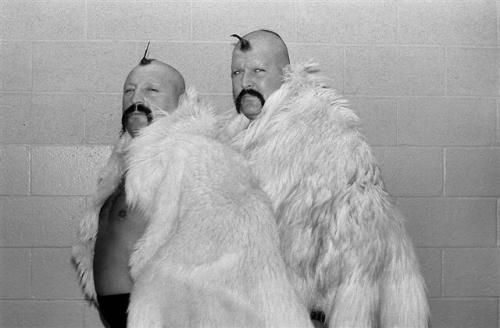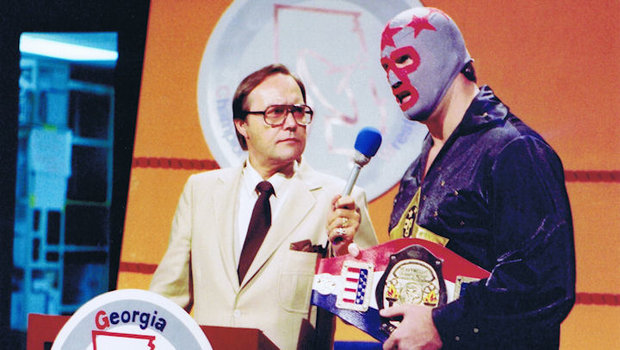Presented by Kayfabe Commentaries
Hosted by Jim Cornette
In the 40’s Atlanta became a wrestling hotspot, and by the 60’s the local show spread through syndication.
Ray Gunkel rose to fame as a wrestler in the area. Soon he became a top star in the 60’s and ultimately part owner and booker. His sudden death in 1972 led to his wife Ann attempting to keep her stake in the business. The other owners attempted to screw her on a fair value for a buyout, then ultimately closed down the company and started a new venture without her involvement.
Ann ended up going to Ted Turner and convincing him to put a wrestling show “All-South Wrestling”, owned by her, on his small TV channel. It aired right before her competition’s “Georgia Championship Wrestling”. The old talent poured into Ann’s promotion, and the NWA responded by sending every available top talent other areas could spare to Georgia. Gunkel held strong until the NWA convinced Jim Barnett to come in from Australia and help. Barnett’s political connections, along with Gunkel’s talent roster becoming stale led to All-South going under after several years of battle. .Soon after came WTBS, and the famous 6:05 timeslot was established on cable, leading millions of fans to watch the best of the best wrestle each week on National TV.
Bill Eadie worked for both Ann Gunkel (as a Mongol) and the NWA’s Georgia promotion (as the Masked Superstar) during the war.

The competing shows not only shared the same TV station, but the same studio. They would tape back to back. Jim Barnett’s people would do their best to make the transition difficult each week for Gunkel by taking down the ring in between tapings and such.
The wrestlers did not care about the “war” and remained buddies in the “locker room” that both groups used.
Ann Gunkel was able to convince so many talents to join her group thanks to the respect her husband Ray carried with the other workers.
Barnett’s group had a lot more money backing them, and it helped snuff out Gunkel as the NWA simply paid better.
Eadie left Gunkel to work for another outlaw promotion: Eddie Einhorn’s IWA. Einhorn was attempting to run a national promotion, with the wrestlers getting retirement benefits, guaranteed contracts and other perks.
The Spoiler, Don Jardine, was working on top for the Crockett’s, he became a headache for booker George Scott, whose solution was to ask Eadie to become “The Masked Superstar” to replace him.
“When I became a heel, Geeto Mongol made me a specialist “eyes, ears, nose and throat”.
Eadie changed vehicles after his gimmick switched, in order to keep kayfabe alive in case some fans would remember what Bolo Mongol drove.
Eadie gave his notice to Jim Barnett, which shocked Barnett since few talents would want to leave the Atlanta hotbed.
Corny tells a funny story about Jerry Jarrett doing a Barnett impersonation in the locker room, only for Barnett to walk in during the middle of it.
Since George Scott created the “Masked Superstar”, Eadie figured that would equal a good push for the gimmick and a lot of money for him.
The Georgia territory was pretty tight, with all the shows emanating from towns which were all around 2 hours or less outside of Atlanta.
The WWF and AWA World champions came to the Omni to defend their gold. This was almost unheard of for any other NWA stronghold.
Southern wrestling was generally up tempo, with feuds lasting upwards of six months with weekly towns and new stipulations added for intrigue. The WWWF was slow paced, ran towns monthly and tended to snip major feuds off after three months.
The WTBS studios had no locker room. The wrestlers changed in empty cubicles with office workers and newscasters walking around them.
As soon as the Atlanta TV was done taping on Saturday morning, the wrestlers had to zoom down to Columbus for another hour of TV tapings. The cops got wind of this and knew they could nail the guys for speeding every Saturday if they wished.
After that taping, the crew had to head to a third town for that night’s show.
Austin Idol once won a battle royal and he took the “gimmick” check to the bank and cashed it. Thunderbolt Patterson “won” a Cadillac, then got in trouble for not making payments on it. Patterson told the bank that he won it and it’s on Georgia Championship Wrestling to pay for it, which they did to save kayfabe.
Vince McMahon Sr. tried to bring in the Masked Superstar to MSG, but they still had a ban on masks for wrestlers, so Eadie turned down the gig.
We get side tracked as Corny and Bill spend several minutes lamenting how today’s talent have ti deal with scripted promos, which almost invariably suck.
Babyfaces have to cut promos based in realities, heels can be more over the top.
Ole Anderson booked the Masked Superstar to eliminate as many of Georgia’s other masked talent as he could in order to build to a final confrontation with Mr. Wrestling II.
Mr. Wrestling II was stiff, but he was a vet, drew money and the fans loved him.
Masked Superstar was given the “Cobra Hold” submission as a finisher. It was so well protected that even Andre the Giant refused to break it when he and Eadie clashed.
The payoffs for working on top were huge. Main event talents could make around 20 grand a week, when adjusted for inflation.
Ticket prices are absurd now. Front row seats in the 70’s were maybe 10 dollars at the Omni, now they are 275 bucks for a WWE show in Atlanta..
Tommy Rich had the “it” factor. He could sell like crazy, bleed buckets, cut promos and had the fans going bonkers.

Thunderbolt Patterson stunk in the ring. Eadie worked hard to try and get a good match out of him, but Patterson would complain to the office about how stiff Eadie was. Patterson would not sell, so Eadie would lay in the shots to make him sell. .
Greg Valentine did not take a bump for Superstar’s flying clothesline one night. This annoyed Eadie, so the next night he laid into Valentine with a stiff clothesline to make sure he went down this time.
Thunderbolt Patterson could draw money, but he refused to lose, which made making him a champion awfully hard. This lead to Patterson crying racism and suing the promoters. The promoters then booked him again, the lawsuits vanished, and the process repeated itself.
Jim Wilson, a marginal talent, was a local Atlanta football player who got a push. Somewhere along the way, Wilson claims that Jim Barnett offered him the NWA title…then wanted sex. When Wilson refused, the title hopes vanished and lawsuits followed. Corny and Eadie both shit on him for more than likely being a liar, a fraud and a crappy wrestler.
Wahoo McDaniel’s chops bruised up Eadie’s chest to the point of it bleeding nightly. Eadie begged him to stop. If he wanted to work that style, he should go work with Valentine and Ric Flair, who loved the chop battles.
Corny insulted Ron Garvin and Wahoo on WTBS one time and they beat the piss out of Bobby Eaton and Dennis Condrey in the ring that night out of frustration. The Express pleaded with Cornette to never do that again.
Tony Atlas was green and willing to learn. Eadie enjoyed working with him.
Eadie ran the same angle in the Carolinas, Montreal and Japan where he burnt an opponent with a cigar. The simple angle worked and each incident led to months of matches and bloodshed.
Jim Cornette was at ringside for the infamous night at the Omni where Ole Anderson and Dusty Rhodes faced the Assassins in a cage with Ivan Koloff and Gene Anderson as special refs. Everyone in the ring turned on Dusty and left him a bloody mess as the fans nearly rioted.
Roddy Piper became a color commentator on WTBS in 1982. This showcased Piper’s promos and eventually he became so popular for his verbal prose that he was turned babyface.
Ray Stevens once took a bump to the cement after Ox Baker missed his que to catch him. Stevens ended up landing split legged and tore up his groin muscles.
Stevens got married while in Minnesota for the AWA. He left the territory and did not tell his wife. A year and a half later he came back and was shocked to learn she divorced him.
Bruno Sammartino came down to defend his WWWF title in Atlanta several times. Eadie claims it did not draw, perhaps because the fans did not know him well.
This leads to Corny explaining how Memphis once ran Jerry Lawler vs. Superstar Graham and AWA champ Nick Bockwinkel vs. Bill Dundee on a card, drawing 6000 fans. The next month they brought back Jackie Fargo, left off the outside talent like Graham and Bockwinkel, and drew 8000 fans.
Ole Anderson tried to expand Georgia in 1983, spreading north and teasing a partnership with Joe Blanchard to expand to Texas and the west coast. This led to more and more talent and dates being used to push into Ohio and beyond. Atlanta fans were left in the cold.
Jim Barnett was pilfering funds to keep up a lavish lifestyle, and since business was down, Ole gathered the Georgia partners up and ousted him from power. This created a powerful enemy for Anderson to deal with.
The Road Warriors were created in the summer of 1983, but they were only a band-aid on a bullet wound as business trended down.
Barnett helped Vince McMahon arrange a buyout of the Brisco Brothers for their points in Georgia. Paul Jones was also convinced to sell due to his poor health and suddenly Vince McMahon owned the NWA’s most potent TV outlet.
The WWF did not do well in the ratings, and did not offer new matches, instead showing bouts from other TV tapings. This led to Turner and McMahon having a falling out and JCP bought the slot in March of 1985.
The Omni was usually 75% full during much of the hot period from 72-82. By the time WCW ran the Omni in the early 90s, they could not even draw 1000 fans. Eadie is aghast at this news.
Final thoughts: If your know the story of Georgia wrestling well, then this shoot won’t find you much in the way of new information. However, Eadie is a very good speaker and he and Corny know their wrasslin’ so it is no doubt a fun trip down memory lane.


